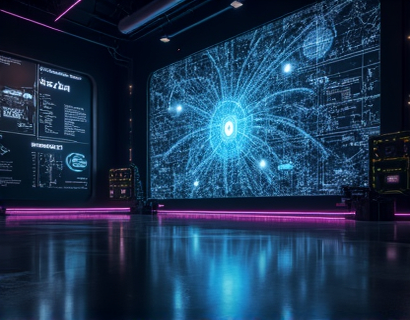Transforming Music Industry Navigation with AI Chat Interfaces
The music industry, known for its constant evolution and dynamic nature, presents both opportunities and challenges for professionals and enthusiasts alike. In this rapidly changing landscape, staying informed and making informed decisions is crucial. The introduction of AI chat interfaces represents a significant leap forward in providing instant expert insights and real-time trends, empowering users to navigate the music industry with unprecedented ease and confidence. This article delves into how these advanced chat systems are revolutionizing access to information, enhancing decision-making, and fostering innovation in the music sector.
Understanding AI Chat Interfaces in the Music Industry
AI chat interfaces are sophisticated tools that leverage natural language processing and machine learning to engage users in conversational interactions. Unlike traditional Q&A systems, these interfaces understand context, nuances, and intent, allowing for more natural and effective communication. In the music industry, these chat interfaces serve as a bridge between users and a wealth of expert knowledge, industry trends, and service recommendations.
Instant Access to Expert Insights
One of the most significant advantages of AI chat interfaces is their ability to provide instant access to expert insights. Music professionals and enthusiasts can engage in real-time conversations with AI systems that have been trained on extensive datasets encompassing industry knowledge, historical data, and current trends. Whether it's understanding the impact of streaming services on album sales or gaining insights into the latest music production techniques, users can receive detailed and accurate information promptly.
For instance, a music producer seeking advice on the best software for a specific genre can have a detailed discussion with the AI, receiving recommendations based on the latest market trends and expert opinions. This immediate access to expert knowledge helps users make informed decisions, saving time and enhancing the quality of their work.
Real-Time Trends and Market Insights
Staying ahead in the music industry requires a deep understanding of current trends and market dynamics. AI chat interfaces excel in providing real-time updates on industry trends, consumer behavior, and emerging technologies. By analyzing vast amounts of data from various sources, these systems can identify patterns and insights that might not be immediately apparent to human analysts.
For music industry businesses, this means staying informed about the latest listening habits, popular genres, and regional trends. Artists and labels can leverage these insights to tailor their strategies, from marketing campaigns to album releases. For example, an AI chat interface might alert a label to a rising trend in a particular genre in a specific geographic area, prompting them to focus their promotional efforts accordingly.
Enhancing Decision-Making with Data-Driven Insights
The data-driven nature of AI chat interfaces significantly enhances decision-making processes in the music industry. By providing users with evidence-based recommendations and analysis, these systems help mitigate the risks associated with creative and business decisions. Whether it's choosing the right distribution channels, selecting the most effective marketing strategies, or identifying potential collaborations, AI chat interfaces offer data-backed insights that inform and guide users.
For instance, a music festival organizer can use an AI chat interface to analyze historical attendance data, weather patterns, and local event calendars to optimize the festival schedule and venue selection. This level of data-driven decision-making not only improves the success rate of events but also enhances the overall attendee experience.
Personalized Recommendations and Content Discovery
AI chat interfaces can also serve as powerful tools for content discovery, helping users find new music, artists, and services tailored to their preferences. By analyzing user behavior, listening history, and expressed interests, these systems can provide personalized recommendations that enhance the user experience.
For music enthusiasts, this means discovering new artists and albums that align with their tastes, often uncovering gems they might have otherwise missed. For industry professionals, personalized recommendations can inform curation decisions, playlist creation, and content marketing strategies. This personalized approach not only enriches the user experience but also fosters deeper engagement with the music ecosystem.
Supporting Creative Collaboration and Innovation
The collaborative nature of the music industry is another area where AI chat interfaces can make a significant impact. By facilitating connections between artists, producers, and other industry professionals, these systems can help break down barriers and foster new collaborations. AI chat interfaces can suggest potential collaborators based on shared interests, complementary skills, and past successful projects.
Moreover, these interfaces can assist in the creative process itself, offering suggestions for song structures, lyrics, and production techniques. For emerging artists, having access to such insights can be invaluable, helping them refine their craft and stand out in a crowded market. For established artists, AI-driven suggestions can inspire new directions and keep their work fresh and relevant.
Building Trust and Credibility
Trust and credibility are paramount in the music industry, where reputations and careers can hinge on the quality of information and advice. AI chat interfaces, when designed with transparency and accuracy in mind, can build trust with users by providing reliable and up-to-date information. These systems can cite sources, reference expert opinions, and clearly indicate the basis for their recommendations, ensuring that users have confidence in the insights they receive.
Additionally, continuous learning and improvement are key components of AI chat interfaces. By incorporating user feedback and updating their knowledge bases regularly, these systems can maintain high standards of accuracy and relevance, further enhancing user trust.
Overcoming Challenges and Ensuring Effectiveness
While AI chat interfaces offer numerous benefits, there are challenges to consider. Ensuring the quality and relevance of the data used to train these systems is crucial. Inaccurate or outdated information can lead to misguided decisions and undermine user trust. Therefore, continuous monitoring and updating of the knowledge base are essential.
Another challenge is the need for natural language understanding and context awareness. AI chat interfaces must be able to grasp the nuances of human language and understand the specific context of each interaction to provide meaningful and accurate responses. Advances in natural language processing and machine learning are continually addressing these issues, but ongoing refinement is necessary.
Integration with Existing Industry Tools and Platforms
To maximize their impact, AI chat interfaces should be integrated with existing tools and platforms used by music industry professionals. This integration can include music streaming services, social media platforms, content management systems, and industry-specific databases. By seamlessly connecting with these tools, AI chat interfaces can provide a more comprehensive and cohesive user experience.
For example, an AI chat interface integrated with a music streaming service can offer real-time insights into song performance, listener demographics, and engagement metrics. This level of integration not only enhances the utility of the chat interface but also creates a more connected and efficient music ecosystem.
Future Prospects and Potential Innovations
The future of AI chat interfaces in the music industry is promising, with ongoing advancements in AI technology opening up new possibilities. One potential innovation is the development of multi-modal interfaces that combine text, audio, and visual elements to provide richer and more immersive interactions. This could include virtual music production environments where users can experiment with sounds and compositions guided by AI recommendations.
Another area of potential is the use of AI chat interfaces in live events and performances. Imagine an AI system that can analyze real-time audience reactions and adjust the performance on the fly, creating a more engaging and dynamic experience. Such innovations could redefine the way music is created, consumed, and experienced.
Conclusion
AI chat interfaces are poised to transform the music industry by providing instant expert insights, real-time trends, and personalized recommendations. These tools empower music professionals and enthusiasts to navigate the industry with confidence and ease, fostering innovation and enhancing the overall user experience. As technology continues to evolve, the potential for AI chat interfaces to further revolutionize the music sector is vast, offering exciting opportunities for growth and creativity.










































